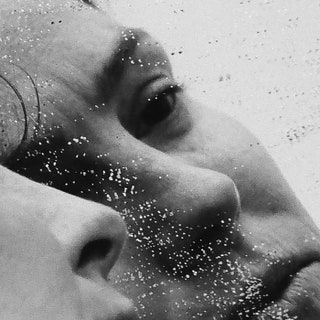With sparse acoustic arrangements and cryptic lyrics, the songwriter’s fifth solo album feels like a series of intimate dispatches from a personal purgatory.
Emma Ruth Rundle lives on a gloomy planet. Drop a needle on one of her records and imagine her shuffling down an otherwise sunny street beneath her own personal raincloud, shivering in an oversized trench coat. The clouds gather as you listen, and before long, darkness has fallen. Follow her voice through the night into a sprawling cemetery where a new monster lurks behind each tombstone: a black dog here, a medusa there, a nightmarish whisper-scream further down the row.
Engine of Hell’s setting is no less bleak, but now Rundle stands alone among the mausoleums, digging up skeletons buried deep in her psychogeography. Stripped of drums and effects, the album is emphatically intimate. It’s unsettling to hear her peel back the defense mechanisms she’s often placed between herself and the trauma embedded in her source material, but it’s hard to look away.
Rundle’s power has grown with each new solo album. On 2014’s Some Heavy Ocean, she peeked out from the melancholic morass that characterized her contributions to the downcast post-rock of Marriages and Red Sparowes. She reincorporated her beloved reverb and death-march drum lines into 2016’s Marked for Death and 2018’s On Dark Horses, but these churning undercurrents were no match for her vocals. Collaborating with southern Louisiana sludge band Thou on 2020’s May Our Chambers Be Full, Rundle held her own. Her rich, smoky alto simmered in moments of bitter reflection and warped into a sneering falsetto when the pain flowed freely.
If that album’s brilliance was at times dimmed by sonic excess, Engine of Hell is crystallized by its austerity. It was recorded live, its instrumentation entirely acoustic. Rundle accompanies herself, alternating between piano and guitar. Her arrangements are sparse and simple, though her skill on the guitar is evident even when she’s merely strumming a few minor chords. Her relationship with the piano is more complicated: She played the instrument growing up but abandoned it in her 20s when she decided it didn’t fit her music. She’s a competent player, but her attack often feels tentative, and her voicings are uncharacteristically open and airy.
“Body” begins like an anonymous Lite FM ballad, but the melodramatic intro accentuates the grit in Rundle’s vocal delivery. Over childlike chords, she sings about the grandmother who bought her first piano and cared for her as a teenager until the older woman’s death. The consoling mantra of the chorus—“You know my arms are always around you”—echoes in her head as she watches her grandmother’s body being wheeled away. “We’re moving the body now,” she sings, as collaborator Troy Zeigler rasps the album’s only backing vocal, many octaves beneath her. In a different, earlier Rundle song, “moving the body” might have been the prelude to something more gothic and horrible, but here it’s an act of mourning and letting go.
Elsewhere on Engine of Hell, she cuts biblical allegories down to quotidian size. In “Blooms of Oblivion,” where she allows herself a modicum of lushness in the form of Jo Quail’s cello, Judas is a heroin addict waiting in line for methadone. And in “Razor’s Edge,” Lazarus is the traveling companion of a self-destructive twentysomething who’s “spending all my money as the petty cash of youth runs out.” Cryptic realism is Rundle’s strongest mode; the lyrics are less effective when they tend towards simple abstraction. “Citadel,” a baroque song-poem, feels detached without a more lifelike stand-in for the “fortress in my heart” or the “destroyer in my blood.”
If the first seven songs on Engine of Hell offer glimpses into Rundle’s worst moments, then the final track is where she casts her gaze toward eternity. “Taken to task in some engine of Hell/I lack the toll to cross the river there,” she begins. Discussing the record with Stereogum, Rundle described the titular metaphor as “this mechanism through which you’re forced to rewatch and relive memories over and over again.” The raincloud hung heavy over her past four records; on Engine of Hell, it breaks open. The personal tragedies that come pouring out are scarier than any of the grisly apparitions she used to conjure.



0 comments:
Post a Comment